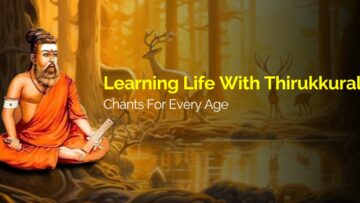Saathvik Devarakonda will be presenting a paper on Virtue Epistemology and Indian Philosophy titled “Epistemic Ethics in Jain Philosophy” at the Early Career Researchers’ Conference organized by the University of Nottingham, UK, this month, funded partly by Indic Academy.
In this interview he speaks about his paper which delves into the concept of epistemic ethics within the context of Jain philosophy, considering the influence of Jain ethical concepts such as Aparigraha (non-possession/non-interference), on potential externalist epistemic practices that emphasize on further notions like compassion and intellectual empathy in philosophical endeavors. It scrutinizes how Syadvada (Jain theory of the relativity of knowledge) and Nayavada (Jain theory of perspectivism) within Jainism might contribute to the development of epistemic ethics, aligning virtuous principles with the pursuit of knowledge.
How did you get interested in studying Jain Philosophy?
When I was a recent high school graduate in the summer of 2021, before commencing my undergraduate studies in philosophy, I engaged in independent study to familiarize myself with the history of Indian traditions. Exploring various secondary sources, including works like Chandradhar Sharma’s A Critical Survey of Indian Philosophy and Jadunath Sinha’s Outlines of Indian Philosophy, I sought insights into the complexities of the world. Jain philosophy, particularly its conceptions lying in relative-pluralism, provided intriguing answers to my questions. I resonated with the apparently-plausible metaphysics and epistemology of Jainism and, in simpler terms, found alignment with its philosophy. My curiosity deepened as I explored sections of Umaswati’s Tattvartha Sutras and Mallisena Suri’s Syadvadamanjari, fostering a profound fascination with this venerable school of thought.
How does Jain philosophy approach the concept of epistemic ethics, and what role does it play in the pursuit of knowledge and truth? What are the fundamental principles of epistemic ethics in Jainism, and how do they guide individuals in their intellectual and moral endeavors?
While engaging in philosophy, the critical aspect is the state of one’s epistemic framework. Shaped by metaphysical and ontological commitments and their interconnectedness with surrounding factors, our epistemic framework dictates our ethics—the manner in which we act based on our best knowledge and beliefs. Hence, it is very essential to keep our epistemic framework healthy to both acquire and disseminate knowledge purported towards sound philosophizing.
The branch of philosophy that could exclusively deal with questions pertaining to the virtue of being a good knower to maintain a healthy epistemic framework, is what I refer to as epistemic ethics. In the realm of epistemic ethics, Jain philosophy stands out with its distinctive approach. It champions a robust epistemic framework that transcends biases, emphasizing specific practices over inherent qualities or gunas considered essential for competent knowledge seekers. At its core are three key tenets elucidated by Natmal Tatya in his introduction to Tattvartha Sutras – aparigraha or non-possession, anekanta or non-absolutism, and ahimsa or non-violence. The concept of aparigraha extends beyond the mere non-possession of physical objects to include ideas. Pujyapada Devanandi’s commentary on the Tattvartha Sutra, known as Sarvarthasiddhi, delves into the idea of knowledge, intuition, and thought as possessions. While those who attain Kaivalya may not perceive possession towards thoughts, knowledge, and intuitions, for truth aspirants, clinging to specific ideas risks fostering dogma. Dogma, in turn, interferes with the autonomy of others’ thoughts, words, and actions, constituting intellectual violence or himsa. Jainism underscores that each vantage possesses relative validity due to anekanta, demanding practitioners to grapple with cognitive issues for a robust epistemic framework.
In Jain epistemic ethics, the pursuit of knowledge harmonizes with the fundamental principles of aparigraha and ahimsa, exemplified by ‘anekantavada‘ or non-absolutism. This doctrine recognizes the intricate nature of reality, urging individuals to embrace diverse perspectives for a comprehensive understanding. The ethical dimension lies in committing to approach knowledge with an open mind, recognizing the limitations of one’s viewpoint, and respecting the autonomy of diverse perspectives. Adding a layer of epistemic humility, Jainism emphasizes ‘syadvada.‘ By acknowledging that reality can be expressed in multiple ways based on one’s perspective, ‘syadvada‘ encourages a nuanced and tolerant approach to knowledge by qualifying all statements with perhaps (acknowledging the scope for falsifiability of knowledge). This aligns with the broader ethical goal of fostering a harmonious and respectful intellectual environment. Therefore, Jainism’s conception of epistemic ethics, with its emphasis on openness, humility, and respect for diverse perspectives, paves the way for a rich and ethical pursuit of knowledge within the philosophical landscape in my opinion.
In Jain philosophy, how is the relationship between right perception (Samyak Darshana) and ethical conduct (Samyak Charitra) elucidated concerning the acquisition and application of knowledge?
Philosophy is a dialectical endeavor. And when I say dialectics, I mean it from an evolutionary sense of perspective. I think Samyak Darshana and Samyank Charitra are quite intimately related. When we have an appropriate world view, as Samyak Darshana emphasizes, our vantage becomes such that we address the appropriate questions to reach the relatively right knowledge, which is Samyak Jnana, for our larger pursuit of truth. Samyank Charitra, or the right conduct is in distinct senses is both a cause and an effect of right perception as it also influences our perception of the world. The seventh chapter of Tattvartha Sutra deals with the idea of Samyak Charitra – the vows one has to take of abstinence from violence, falsehood, stealing, carnality and possessiveness.
To follow these vows, which is to put them to animate actions, one must inculcate them in thought which ought to govern the action. These vows ultimately translate into following ahimsa, anekanta and aparigraha. As per how I interpret the Jain philosophy, the relationship between Samyak Darshana and Samyak Charitra is symbiotic. Right perception serves as the foundation for ethical conduct, and ethical behavior such as respecting the autonomy of the other, inculcation of non-absolutism in thought, in turn, nurtures and refines the clarity of perception. In this fashion, while both receiving and conveying knowledge, I would by the virtue of truth be cautious of my implicit biases which could foster dogmas and acknowledge my limitations while conveying the same to another being. This interconnectedness of Samyak Charitra and Samyak Darshana forms the essence of a holistic and ethical approach to the acquisition and application of knowledge within the Jain tradition.
How does the concept of Anekantavada (the doctrine of non-absolutism) influence epistemic ethics in Jain thought, particularly in dealing with diverse perspectives and truths?
We live in an infinitely complex world driven by the scientific methods to push the walls of known into the unknown. We draw inductive inferences every now and then to frame a generalized heuristic lens to interpret and comprehend the current and future phenomena we might encounter and address the challenges they might pose us with. In such an endeavor, our observation is necessarily influenced by the current theoretical understanding (which could be falsified soon enough). There are infinite courses our comprehension could hence take, and to wade through these complexities, it is necessary for us to take a moment to acknowledge the multifaceted nature of reality. We often encounter multiple explanations to a phenomenon or plural perspectives on a given issue that might even appear to be radically contradictory. For each perspective of ours, we might show certain possessive tendencies that could result in dogma (ultimately violence in thought), by searching for resonating evidence that leads to the risk of a confirmation of bias. Not only does such a dogmatic belief lead to unwarranted absolutism, it also results in the interference with the autonomy of the other, and proves to be harmful to both the self and the fellow being. Therefore, rationally speaking, we need a framework that can accommodate pluralism without ending up in skepticism. Jain metaphysics, or Anekantavada, correlates to such a view of reality and seems to be the best fit framework for the task of harmony.
Let’s take the instance of Tycho and Kepler, two pre-telescopic astronomers, who observed the movements of Mars with two different world views — geocentric world view and heliocentric world view respectively. Tychoo was from an era that believed in the geo-centric model of our solar system. Though the observations he made on the movements of Mars are very essential to expand our understanding about certain heavenly bodies, placing the earth in the center of the solar system somewhere or the other disrupts the idea that observation is straightforward and objective. Kohler on the other hand studied the movements of the same Mars with a heliocentric framework in mind. I see this as a dialectical interaction between two individuals, two world views, and two vantages to view the same phenomenon where the one in temporal progression falsifies the former.
Therefore, while understanding the infinite possibilities and qualities of our reality, or even while performing an observation as simple as viewing an object, it is necessary to first acknowledge the limitations of our sensory experience, and the knowledge we have mustered up till yet using sensory data, because somewhere or the other, the implicit belief that confirms our current worldview could impact the way we process and describe information impacting our epistemic framework. Hence, by the virtue of truth, in epistemic ethics, alongside anekantavada, its epistemic corollary – syadvada – also become an important practice of conditioned predication as a sign of epistemic humility. When we acknowledge our limitations while dwelling in an infinitely complex reality, it becomes an excellent opportunity to further the dialectical evolution of knowledge traditions for the sake of a preparatory endeavor of keeping ourselves ready for the future complexities and challenges. And in this course, a notion of an ethics of thought or epistemic ethics seems essential to avoid any sort of regress.
In the Jain tradition, how do epistemic ethics intersect with the practice of non-violence (Ahimsa) and compassion (Karuna) in the pursuit of knowledge?
In the Jain tradition, the synergy of epistemic ethics with the tenets of non-violence (Ahimsa) and compassion (Karuna) is integral to the quest for knowledge. Rooted deeply in Jainism, the ethical framework of Ahimsa transcends physical harm, encompassing intellectual and verbal spheres. This principle forms a profound connection with epistemic ethics in several dimensions. Jain epistemic ethics places a strong emphasis on valuing diverse perspectives, resonating with the spirit of Ahimsa. This commitment creates an intellectual milieu that shuns aggressive discourse, aligning with the non-violent ethos. Simultaneously, the practice of Karuna, or compassion, within epistemic ethics involves a deep understanding and empathy toward varying viewpoints.
This compassionate comprehension is a cornerstone of Jain epistemic ethics, fostering a mutually enriching exchange of ideas. In the pursuit of knowledge, Jain epistemic ethics guides individuals to exercise intellectual Ahimsa. It advocates for the responsible use of knowledge, steering clear of arguments that may cause harm or disrespect to others. While encouraging assertiveness in presenting one’s views, Jain epistemic ethics maintains a delicate balance, ensuring that intellectual exchanges remain non-violent and respectful. Respecting the autonomy of others emerges as a core tenet of Jain epistemic ethics. This acknowledgment recognizes every individual’s right to uphold their perspectives without coercion or intellectual aggression. The practice of compassion (Karuna) in knowledge-seeking involves engaging in dialogues infused with understanding and empathy. This compassionate approach contributes to cultivating a positive and constructive intellectual environment. Hence, the intersection of epistemic ethics with non-violence and compassion in the Jain tradition creates an intellectual space characterized by respect, understanding, and a commitment to preventing harm in the pursuit of knowledge. These ethical principles serve as guiding forces, fostering an atmosphere of harmony, humility, and compassion in the realm of intellectual exchanges.
Can you elaborate on the role of introspection and self-awareness in Jain epistemic ethics, and how these contribute to the ethical dimension of knowledge acquisition?
In Jain epistemic ethics, the role of introspection, often referred to as ‘anupreksha dhyana,’ and self-awareness holds significant importance, contributing to the ethical dimension of knowledge acquisition. Anupeksha dhyana, though not an equivalent of introspection, is still the closest concept we can deal with while trying to understand the contribution of introspective methods to the ethical dimension of knowledge acquisition in Jainism. Introspection involves a deep and systematic self-examination of one’s thoughts, motives, and actions. In the context of epistemic ethics, this self-reflection helps individuals to become aware of their biases, preconceptions, and potential sources of intellectual dogma. Anupreksha Dhyana encourages practitioners to identify their implicit biases that might influence the acquisition and dissemination of knowledge. By acknowledging and understanding these biases, individuals can strive for a more impartial and open-minded approach to knowledge. And further introspection fosters humility by making individuals aware of the limitations of their own perspectives. Recognizing that one’s understanding is inherently partial and subject to personal biases contributes to a more open and receptive attitude toward alternative viewpoints.
Such self-awareness in Jain epistemic ethics involves understanding one’s positionality in terms of socio-cultural, philosophical, and personal contexts. This awareness is crucial in recognizing how personal experiences and background might shape one’s approach to knowledge. Self-awareness also encourages individuals to seek knowledge responsibly. This includes critically evaluating information sources, being mindful of potential prejudices, and ensuring that the pursuit of knowledge aligns with ethical principles. Therefore, introspection and self-awareness in Jain epistemic ethics form integral components in the ethical pursuit of knowledge. They facilitate the identification and mitigation of biases, nurture humility and open-mindedness, and contribute to a respectful and empathetic engagement with diverse perspectives.







